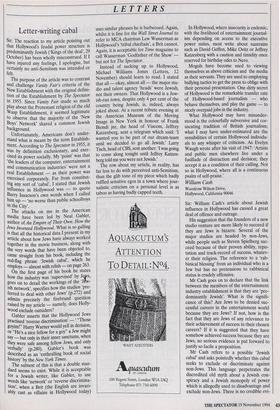LETTERS Letter-writing cabal
Sir: The reaction to my article pointing out that Hollywood's feudal power structure is predominantly Jewish (`Kings of the deal', 29 October) has been wholly misconstrued. If I have injured any feelings, I apologise, but certainly no anti-Semitism was intended or felt.
The purpose of the article was to contrast and challenge Vanity Fair's criteria of the New Establishment with the original defini- tion of the Establishment by The Spectator in 1955. Since Vanity Fair made so much play about the Protestant religion of the old Wasp Establishment, it seemed legitimate to observe that the majority of the `New Boys' Network' shared a common Jewish background.
Unfortunately, Americans don't under- stand what is meant by the term Establish- ment. According to The Spectator in 1955, it was by definition exclusionary, and exer- cised its power socially. My `point' was that the leaders of the computer, entertainment and communication industries' were not a real Establishment — as their power was exercised corporately. Far from constitut- ing any sort of 'cabal', I stated that Jewish influence in Hollywood was — to quote Barry Isaacson's own words when I called him up — 'no worse than public schoolboys in the City'. The attacks on me in the American media have been led by Neal Gabler, author of An Empire of Their Own: How the Jews Invented Hollywood. What is so galling is that all the historical data I present in my article about how Jews have always worked together in the movie business, along with the very words that have been objected to, came straight from his book, including the red-flag phrase `Jewish cabal', which he employs — almost with relish — on page 263. On the first page of his book he states how the industry was 'supervised' by Jelvs, goes on to detail the workings of the 'Jew- ish network', specifies how the studios `pre- ferred to deal with other Jews' (p.272) and admits precisely the firebrand question raised by my article — namely, does Holly- wood exclude outsiders?
Gabler asserts that the Hollywood Jews practised `reverse discrimination' — ` "Those goyim!" Harry Warner would yell in derision, or "He's a nice fellow for a goy" a Jew might say — but only in their inner sanctums, when they were safe among fellow Jews, and only verbally' (p.280). Gabler's book was described as an 'enthralling book of social history' by the New York Times. The subtext of this is that a double stan- dard seems to exist. While it is acceptable for a Jewish writer, like Gabler, to use words like `network' or 'reverse discrimina- tion', when a Brit (the English are invari- ably cast as villains in Hollywood today) uses similar phrases he is barbecued. Again, whilst it is fine for the Wall Street Journal to refer to MCA chairman Lew Wasserman as Hollywood's `tribal chieftain', a Brit cannot. Again, it is acceptable for Time magazine to call Wasserman 'Godfather of the Show' but not for The Spectator.
Instead of sucking up to Hollywood, Michael Williams Jones (Letters, 12 November) should learn to read. I stated that all — okay, almost all — the major stu- dio and talent agency `heads' were Jewish, not their owners. That Hollywood is a Jew- ish-run town, despite only 4 per cent of the country being Jewish, is, indeed, always joked about. At a recent tribute evening at the American Museum of the Moving Image in New York in honour of Frank Biondi jnr, the head of Viacom, Jeffrey Katzenberg, sent a telegram which said: 'I wanted you to be part of our dream-team until we decided to go all Jewish.' Larry Tisch, head of CBS, sent another: `I was going to come along tonight until Jeffrey Katzen- berg told me you were not Jewish.'
The row about my article, in reality, has far less to do with perceived anti-Semitism, than the glib tone of my piece which badly ruffled sensitive egos in a town where jour- nalistic criticism on a personal level is as taboo as having badly capped teeth. In Hollywood, where insecurity is endemic, with the livelihood of entertainment journal- ists depending on access to the executive power suites, most write about suzerains such as David Geffen, Mike Ovitz or Jeffrey Katzenberg with a caution and timidity once reserved for birthday odes to Nero.
Moguls have become used to viewing themselves as above criticism and the media as their servants. They are used to employing bullying tactics to get the press to oblige with their personal presentation. One dirty secret of Hollywood is the remarkable transfer rate of Hollywood-based journalists — who behave themselves, and play the game — to nicely overpaid jobs in the industry.
What Hollywood may have misunder- stood is the colourfully subversive and cor- uscating tradition of British journalism; what I may have under-estimated are the sensibilities of certain Hollywood individu- als to any whisper of criticism. As Evelyn Waugh wrote after his visit of 1947: 'Artists and public men elsewhere live under a fusillade of distraction and derision; they accept it as a condition of their calling. Not so in Hollywood, where all is a continuous psalm of self-praise.'
William Cash
Woodrow Wilson Drive, Hollywood, California 90046


















































































 Previous page
Previous page